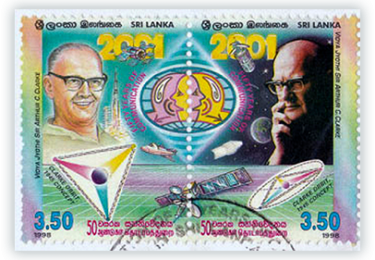Clarke as ICT
promoter
Arthur C Clarke was a versatile communicator of science and technology. He wrote and spoke without jargon, and always explored the social, cultural and economic impacts of new technologies. In particular, he was an expert on the rise and spread of information and communications technologies (ICTs).
Over the years, he promoted the use of telephones, television and Internet as tools enabling both personal and national development. He also advised policymakers to make the right technology choices and investment.
For example, writing a foreword to the UNDP’s Asian Regional Human Development Report on ICTs in 2004, he said: “Our big challenge…is to get ICTs to solve real life problems without creating any new ones. In the early part of the last century, Mahatma Gandhi proposed a simple test for the effectiveness of any development activity: find out how the last man would be affected by it. We should adapt this as a test for ICTs in development: how will the last man, woman and child be reached, touched and transformed by these marvellous communications tools?”
Clarke urged: “We must therefore take a few steps back from the digital hype and first try to bridge the ‘Analog Divide’ that has for so long affected the less endowed communities in developing countries (and even in some developed ones). ICTs should be part of the solution, not the only solution.”

“
Before you become too entranced with gorgeous gadgets and mesmerizing video displays, let me remind you that information is not knowledge, knowledge is not wisdom, and wisdom is not foresight. Each grows out of the other, and we need them all. ”
”
― Arthur C Clarke
“
Before you become too entranced with gorgeous gadgets and mesmerizing video displays, let me remind you that information is not knowledge, knowledge is not wisdom, and wisdom is not foresight. Each grows out of the other, and we need them all. ”
”
― Arthur C Clarke
In February 1998, Sri Lanka’s Department of Posts issued two postage stamps saluting Clarke’s contributions to advancing communications. It was only the third time in Lankan philatelic history that a living person’s image had been depicted on a stamp.
“Improved communications have contributed to higher living standards enjoyed by Sri Lankans, and are today ushering the island nation into a new era of modernisation. Sri Lanka’s journey towards modernity has benefited enormously from the presence of Sir Arthur C Clarke, one of the greatest visionaries of our time and the inventor of the communications satellite,” said the official note accompanying the stamp release.

Clarke at Intelsat headquarters, Washington, DC
1994






